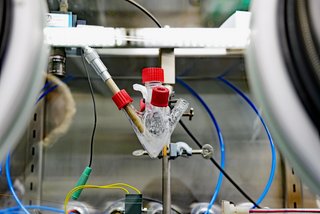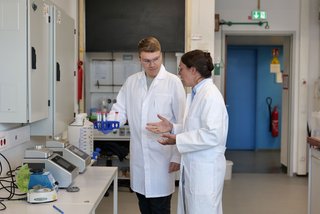Master of Science Chemistry

Advanced material synthesis experiments inside a glove box. Foto: David van Gerven
As a chemist, you are driven by a passion for discovery and a desire to make a meaningful impact. Our Master of Science Chemistry is designed to help you achieve just that. Building on your solid foundation in chemistry, we will provide you with advanced knowledge, practical skills, and expert guidance to take your skills to the next level.
At the University of Cologne, you will join a vibrant community of researchers and scholars who are shaping the future of chemical sciences. You will work alongside experienced professors and young researchers who are tackling hot topics in their field, gaining hands-on experience through practical courses and specializing in areas that suit your interests and career goals.
With our diverse range of research fields, you will have the chance to explore different branches of chemistry, from life sciences to materials science, synthesis, and structures. Wherever your passion lies, you will find opportunities to develop your expertise, preparing you for a successful career in chemistry, whether in industry or academia.
About the program

Prof. Kath-Schorr in the chemistry lab, giving an introduction to a lab equipment to a member of her research group. Foto: David van Gerven
The Master of Science in Chemistry study program is totally renewed and accredited. It will start with the winter term 2024/25 at the University of Cologne and is the consecutive study program of the Bachelor's program in Chemistry. It is an interdisciplinary and research-oriented program, located at the interface between Chemistry, Biochemistry, Medicine and Physics. Students will acquire a strong background in Chemistry and its application in different research fields such as green energy, smart materials and innovative medical applications. The graduates will be enabled to follow many career paths both inside and outside of academia.
- Study program can be started in winter or summer term
- Fully taught in English (German not required but useful for every-day life)
- 2-year full-time program
- Includes 10 modules: 2 advanced, 1 scientific literacy, 2 research focus, 4 specialized lab modules, and a master thesis with defense
- Term-based course schedule
- No limit on places per term, good supervision ratio guaranteed
Term based course schedule
6 CP
6 CP
9 CP
6 CP
6 CP
12 CP
12 CP
15 CP
Research Proposal LM2
18 CP
30 CP
Application for winter term 2025/26
For the winter term starting in October 2025, the application platform will be open from June 2nd to July 15th, 2025.
Requirements for admission
Applicants with non-German BSc degree
- Study program: You have completed a BSc program in Chemistry or similar AND your diploma/grades have been pre-reviewed and transferred to the German grading scale by uni-assist (takes 6-8 weeks). You therefore have a VPD to be uploaded.
- Grade: Your VPD grade is at least 2.5
- Main emphasis of study:
- Candidates have to prove at least 12 credit points in the following areas:
- Inorganic Chemistry and/or Analytical Chemistry
- Organic Chemistry and/or Biochemistry
- Physical Chemistry and/or Theoretical Chemistry
- at least a further 12 credit points in Fundamentals of Mathematics, Statistics and Physics
- and in total at least 60 credit points from Chemical modules.
- Candidates have to prove at least 12 credit points in the following areas:
- Research orientation: To allow for research lab-based studies, we ask for a bachelor thesis or at least for an extended lab project report.
- English: You can proof that your BSc program was taught in English OR you have a
- TOEFL (Paper-based 580, Computer-based 237, Internet-based 93),
- IELTS (average 6,5 - each single component 6,0),
- Cambridge qualifications: B2 First (175),
- TOEIC (listening: 460 – reading: 425 –speaking: 175) certificate.
Applicants with German BSc degree
- Study program: You have completed a BSc program in Chemistry or similar (if not yet completed please see below**)
- Grade: Your final grade is at least 2.5
- Main emphasis of study:
- Candidates have to prove at least 12 credit points in the following areas:
- Inorganic Chemistry and/or Analytical Chemistry
- Organic Chemistry and/or Biochemistry
- Physical Chemistry and/or Theoretical Chemistry
- at least a further 12 credit points in Fundamentals of Mathematics, Statistics and Physics
- and in total at least 60 credit points from Chemical modules.
- Candidates have to prove at least 12 credit points in the following areas:
- Research orientation: To allow for research lab-based studies, we ask for a bachelor thesis or at least for an extended lab project report.
- English: You either have a German Abitur incl. 6 years of English OR you can proof that your BSc program was taught in English you have a
- TOEFL (Paper-based 580, Computer-based 237, Internet-based 93),
- IELTS (average 6,5 - each single component 6,0),
- Cambridge qualifications: B2 First (175),
- TOEIC (listening: 460 – reading: 425 –speaking: 175) certificate.
**To apply for the Master's program before completing your Bachelor's degree, you need to show proof of earning at least 80% of the total credit points. Submit a Transcript of Records with a preliminary grade for the application. If admitted, you must finish your Bachelor's degree by September 30 for the winter term or March 31 for the summer term. Provide proof of completing any remaining exams by the next term's registration deadline (January/July). Failure to do so will invalidate your admission confirmation.
Application procedure
Applicants with non-German BSc degree
Register via uni-assist for a preliminary review (VPD). You do not need to select our master, instead go with "All Subject", but it is important to select the “University of Cologne”. The procedure takes 6-8 weeks.
Go to KLIPS, change to English (de/en button), follow the applicant account link. Enter your details and upload your documents:
- Fully completed application form, available in KLIPS
- School leaving certificate (or an equivalent degree of qualification for access to German universities) (original language and official translation)
- Proof of proficiency in English
- BSc certificate and Transcript of Records (original language and official translation)
- CV (include lab and English skills)
- Letter of Motivation
- VPD by uni-assist
- Candidates from India, China and Vietnam need an APS: International Prospective Master Students
- Bachelor thesis
Get application tips and help also from the international student office here.
Applicants with German BSc degree
Go to KLIPS, follow the applicant account link. Enter your details and upload your documents:
- Fully completed application form, available in KLIPS
- Abitur (or an equivalent degree of qualification for access to German universities) (original language and official translation)
- Proof of proficiency in English
- Bachelor certificate and Transcript of Records (including overall grade)
- CV
- Letter of Motivation
Selecting Modules
For the summer semester 2025: KLIPS portal opens 07.04. - 13.04.2025.
Beginners, please attend the Welcome meeting, before selecting modules.
Scientific Literacy (SL)
Scientific Literacy (SL), the newly created module, provides beginners in the master's program with essential scientific work skills that extend beyond those learned in the bachelor's program. In particular, aspects of scientific integrity, presenting, searching and handling of literature, handling of data, introduction to the most essential software, especially AI applications will be discussed and tried out. In addition, a three-week laboratory internship provides an opportunity to repeat and deepen familiar working techniques as well as to perform unfamiliar techniques for the first time. In addition, the SL module serves as a group-building event where the first-year cohort can connect with their respective academic mentors, learn about specialization opportunities in the master's program, and network socially and professionally with other students or teaching assistants within and outside of the cohort.
Advanced Chemistry (A)
Advanced Chemistry (A) modules feature lecturers from all main areas of chemistry—biochemistry, inorganic, macromolecular, organic, physical, and theoretical—who present core knowledge combined with cutting-edge research. You will learn, recapitulate, and deepen your understanding of modern Chemistry. The modules conveys general knowledge in advanced chemistry and prepare for the more specialized modules in the respective field. You need to choose two A-Modules.
Research Focus (RF)
Research Focus (RF) Modules involve collaboration between two or more lecturers, each contributing their expertise to a modern Chemistry topic. With these modules, you can already make the first steps into specialization or you can broaden your horizon and learn from the many experts within and associated with the department.
Elective RF Modules - Winter Semester
Computational Chemistry
Hanrath, Blunk, Goldfuß
Introduction to (nano) optics
Lindfors, Schubert, Gather
Aspects of Transition Metal Chemistry with Emphasis on Technetium
Wickleder, Strub
From Molecule to Mice to Men
Grüll, Endepols, Kath-Schorr, Neundorf
Mass Spectrometry and its Application in Atmospheric Chemistry
Schäfer, Zorn (FZ Jülich), Hanrath
Elective RF Modules - Summer Semester
Introduction to Nano- & Biophotonics
Gather, Schubert
Photochemistry & Chirality - Synthesis and Devices
Griesbeck, Meerholz
From basic research to industrial products: Modern Drug Design
Giernoth, Kath-Schorr, Hillisch, El Sheikh, Dumele
Functional Nanostructures and Biomaterials
Maleki, Mathur
Subject Modules (SM)

Advanced material synthesis experiments inside a glove box. Cleanroom environment of Prof. Gather's research group at the Department of Chemistry, illuminated by yellow light with reduced blue light sources. A team member is using a scanning electron microscope to examine materials produced within the lab. Foto: David van Gerven
Subject Modules (SM) must be successfully completed, preferably in the 2nd and 3rd terms. The Subject Modules aim to extend the knowledge in the respective research area with 8-week laboratory (practical part) and theoretical training (lecture part). Simultaneously, the students extend their skills of presenting scientific results in oral and written form. To better achieve these competencies, the subject modules contains reporting and presentation elements as prerequisites for the oral examinations. You have to register the Subject Module(s) of your choice via Klips. Each term, Subject Modules are offered in blocks, either in the first or the second half of the term.
Registration will be confirmed via KLIPS at a fixed date some time after registration ends.
Please note, that although we try to assign top priorities first, it is not always possible.
FAQ
We've gathered some common questions and answers to help you navigate the application process. If you still have doubts or concerns, please don't hesitate to reach out to us. We're happy to help!